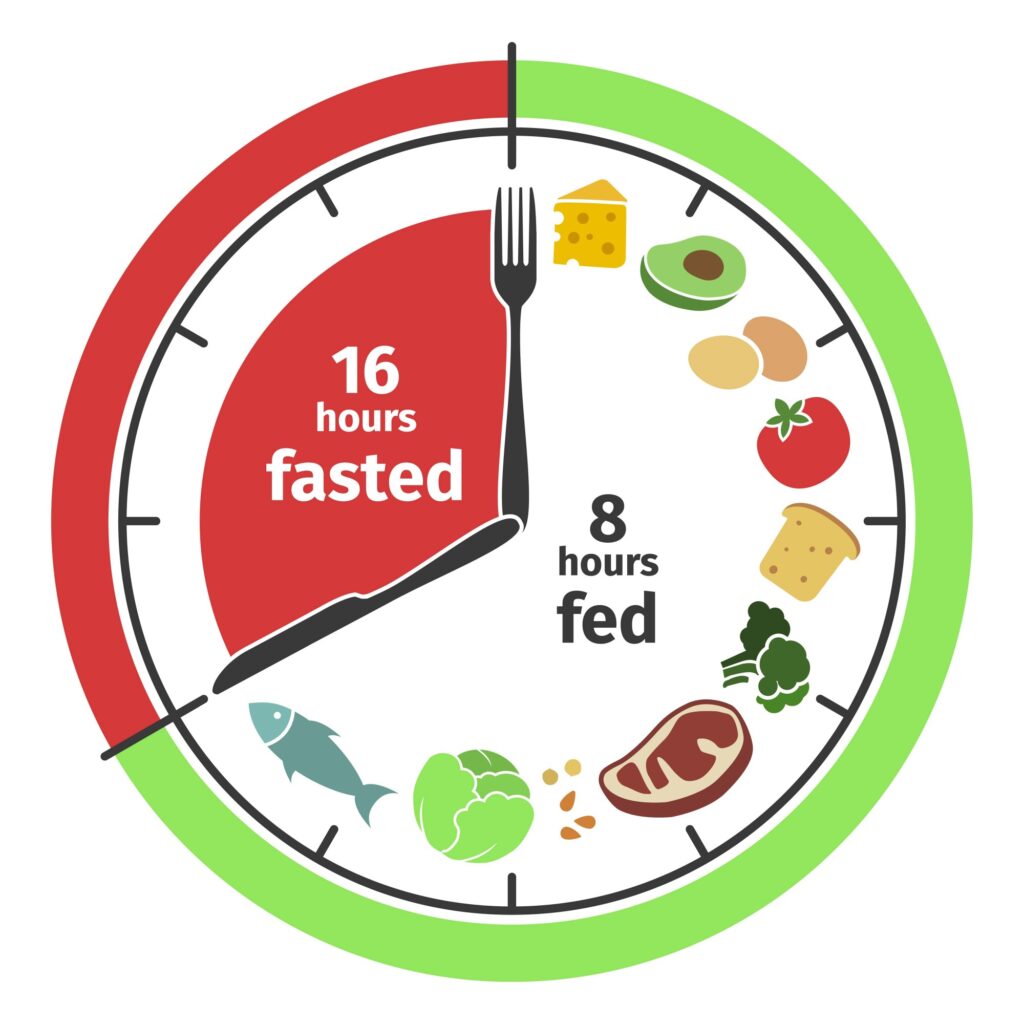Intermittent fasting(IF) is an excellent way to lose fat. Whenever I put on some extra pounds, I always resort to IF to lose those extra kilos. In this article, I’m gonna explain what is intermittent fasting, its types, benefits, limitation, and everything else you need to know about it.
What is Intermittent Fasting?
Intermittent fasting(IF) is an eating pattern in which you eat within a certain window of time during the day and refrain from eating during the rest.
IF is not a diet, it’s an eating pattern. It doesn’t tell you what to eat but when to eat.
Types of Intermittent Fasting?
There are many types of IF and a lot of variations of it. I’m gonna list the 4 most popular and effective types of IF.
1) The 16/8 Method

This is the most simple, effective and popular way of Intermittent fasting and the one that I personally follow.
In this method, you eat within 8 hours during the day and fast for the rest of the 16 hours. The most common eating period that most people follow is between 12:00 PM-8:00 PM.
To follow this, you’re gonna have to skip breakfast, eat lunch/brunch after 12:00 PM and eat dinner before 8:00 PM.
If in the past, you’ve skipped breakfast and ate only lunch and dinner, you’ve followed Intermittent fasting, it is not that difficult.
But, Breakfast is the most important meal of the day?
Contrary to the popular belief, it is NOT. You can skip breakfast and be just fine.
Am I allowed to drink Tea/Coffee during the fasting hours?
Yes, you can drink tea or coffee, but try to drink it without milk or sugar. Anything with calories in it will break your fasting period.
2) 5:2 Method
In this method of Intermittent fasting, you’re gonna have to restrict yourself to eating 500-600 calories on 2 non-consecutive days of the week and eat your normal calories on the rest of the days.
You can choose any two non-consecutive days of the week according to your convenience.
| Day 1 | Day 2 | Day 3 | Day 4 | Day 5 | Day 6 | Day 7 |
| Eat your normal Calories | Eat only 500-600 Calories | Eat your normal Calories | Eat your normal Calories | Eat only 500-600 Calories | Eat your normal Calories | Eat your normal Calories |
If you’re just starting out Intermittent fasting, this method is relatively easier because you are restricting your calories for only 2 days of the week and eating your normal calories on the rest of the days.
3) Alternate Day Fasting
This is an extended version of the 5:2 method. In this method, you’re gonna have to restrict yourself to eating 500-600 calories every alternate day of the week.
| Day 1 | Day 2 | Day 3 | Day 4 | Day 5 | Day 6 | Day 7 |
| Eat your normal Calories | Eat only 500-600 Calories | Eat your normal Calories | Eat only 500-600 Calories | Eat your normal Calories | Eat only 500-600 Calories | Eat your normal Calories |
If you’re just starting out, first try the 5:2 method and when you start feeling comfortable, then try this method.
Restricting your calorie intake every other day is easier than going on a low calorie diet every day of the week.
4) Eat-Stop-Eat Method
This involves fasting for one whole day i.e 24 hours and then resuming your normal diet again.
You can fast for 24 hours once, twice or thrice a week.
| Day 1 | Day 2 | Day 3 | Day 4 | Day 5 | Day 6 | Day 7 |
| Eat | Fast | Eat | Eat | Eat | Eat | Eat |
| Day 1 | Day 2 | Day 3 | Day 4 | Day 5 | Day 6 | Day 7 |
| Eat | Fast | Eat | Fast | Eat | Eat | Eat |
I’d recommend start by fasting for 24 hrs once a week and then increase it to twice and then thrice a week.
You can choose any day of the week according to your convenience.
Benefits of Intermittent Fasting
1) Lose Fat
This is the most common reason why people try the intermittent fasting and it is an excellent way to do so. But, losing weight/fat is just one of the benefits of IF, there are many other benefits as well.
2) Better Mental Clarity
You might have experienced that an empty stomach gives you better mental clarity and focus. Since in Intermittent fasting, you are in a fasted state for most of the time, you have better mental clarity and you make better decisions.
Don’t confuse being hungry with an empty stomach. Being hungry means starving. Having an empty stomach is actually beneficial for your health.
3) Simple Diet Schedule
In all the types of Intermittent fasting, you’re eating fewer meals than normal which means less time spent on cooking and cleaning. Intermittent fasting makes your diet schedule simple and easy.
You don’t need to spend much time on planning and cooking meals and you can utilize that extra time elsewhere.
4) Reduces the Risk of Type 2 Diabetes
Intermittent fasting lowers your insulin resistance which in turn helps lower blood sugar levels.
High blood sugar levels have been associated with Type 2 diabetes. Lowering your blood sugar level will reduce the risk of type 2 diabetes.
5) Help you Live Longer
In one of the studies done on rats, it was found that rats who fasted every other day lived 83% longer than rats who didn’t.
Restricting your calorie intake has always been associated with living longer and healthier. In Intermittent fasting, you’re also restricting your calorie intake by eating less frequent meals which could help you live longer and healthier.
Limitation of Intermittent Fasting
Fasting, in the short run, increases your metabolism but in the long run, it could slow down your metabolism. This is the major drawback of Intermittent fasting.
You don’t wanna be practicing Intermittent fasting for more than 3 months at a time as it could potentially slow your metabolism.
What happens when you eat less frequent meals is that your body becomes accustomed to it and slows down the metabolism to preserve energy.
Who Shouldn’t do Intermittent Fasting
- Pregnant women
- Breastfeeding women
- People with an eating disorder
- Children below age 12
- Old people above 70 years of age
- Underweight people
- People having low blood pressure
- Diabetes patients
Conclusion
Intermittent fasting is an excellent way to lose fat without changing what you eat but only changing when you eat.
The main goal of doing Intermittent fasting is to restrict your calorie intake by reducing the frequency of your meals.
If you compensate for skipped meals by over-eating during your allowed meals, it’s not gonna work. It is necessary that you don’t over-eat during the meals which you are allowed to eat.
If you want to know how I lost 30 kgs in 6 months following only 4 simple and effective steps, read THIS ARTICLE.

